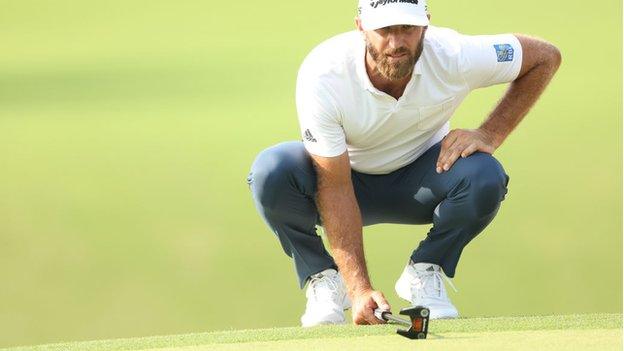Dustin Johnson, Lee Westwood, Ian Poulter: PGA Tour players joining LIV event for money
- Published
- comments

Dustin Johnson has won more than $74m since turning professional in 2007
Leave aside the surprise news that Dustin Johnson will headline the inaugural LIV Golf Invitational near London next week.
The real contest continues to lie outside the ropes and it could not be more significant for the game.
We are now witnessing a battle for the future of men's elite professional golf. Will it remain in the hands of America's PGA Tour, supported by their European-based strategic partners the DP World Tour?
Or will Saudi Arabia-backed upstarts muscle in? LIV Golf Investments, fronted by Greg Norman, is promising to revolutionise the game with a shorter, sharper product that is lucrative enough to attract the biggest names.
It is understood that there are massive signing on fees, running into millions of dollars, so make no mistake, this comes down to money, and the Saudi Public Investment Fund, which is financing Norman's project, has pots and pots of it.
Certainly enough to turn Johnson's head. The 37-year-old US Open and Masters winner sided emphatically with the PGA Tour in February so this is a dramatic change of heart.
"Dustin has been contemplating this opportunity off-and-on for the last couple of years," said Johnson's agent David Winkle in a statement on Tuesday. "Ultimately he decided it was in his and his family's best interest to pursue it."
It is less of a shock that the likes of Spain's Sergio Garcia, England's Lee Westwood and Ian Poulter, and Northern Ireland's Graeme McDowell will be at the Centurion Club in Hertfordshire for next week's shotgun start 54-hole opener.
They made little secret of their interest even though all four were regarded as future European Ryder Cup captains. Occupying that role in coming matches must now be in serious doubt.
DP World and PGA Tour players were refused official permission to take part and sanctions may follow. What action is taken against them remains to be seen.
These players know what they are doing and have signed to a project that is a potential existential threat to the current golfing eco-system. It has £1.6bn worth of backing and a decent chunk of that is heading to their bank accounts.
They are among the 42 names currently revealed for the 48-man tournament next week. Are they rebels or trailblazers?
Will they be banned or fined? And for the Europeans and Americans involved, does this spell the end of their Ryder Cup careers?
There are also implications for events such as the US Open, which takes place the following week, and July's 150th Open Championship.
The various governing bodies are tightly aligned, perhaps more so than at any point in the history of the game.
The United States Golf Association and R&A will therefore be under pressure to support the main tours - who, by the way, they want to convince in the debate over ball distance control.
But these most established governing bodies have a historic duty to protect the "open" nature of their championships. They would surely struggle to bar any Saudi sign-ups eligible to play at Brookline or St Andrews this year.
Like the DP World Tour, the R&A declined to comment when approached by BBC Sport following the Centurion field announcement.
Norman is ready to fight and there is a sense that he would welcome a legal battle. "We will have the players' backs," he has said.
But how safe is Norman in all of this? His recent attempts to brush away questions on Saudi Arabia's human rights record and the murder of Saudi dissident journalist Jamal Khashoggi by saying "we all make mistakes" was roundly criticised.
In the days that followed the highly respected sports executive Sean Bratches departed in what is seen as a big blow to the LIV organisation.
But regarding the golf eco system, LIV feel they are on safe ground to challenge what they view as an unfair monopoly running leading tour golf at the moment. They point to the PGA Tour's non-profit status and their strategic alliance with the DP World Tour.
If bans are imposed, litigation in America seems likely. There are suggestions that it would occur in a California courtroom.
But what jurisdiction might that action have with regards to the Wentworth-based former European Tour? The DP World branded outfit administers tournaments all over the world.
So many questions. Another is where does Phil Mickelson fit into this? The 51-year-old six-time major champion was at the heart of Norman's project until his inflammatory comments were made public in February.
Mickelson was quoted saying the Saudis were "scary" to work with and heavily criticising their regime. At the same time he said it was worth doing business with them for the leverage it provided against a PGA Tour he regards as "greedy".
When these comments were publicised by biographer Alan Shipnuck, Mickelson disappeared from public life.
He pulled out of last month's defence of the US PGA Championship at Southern Hills, having sensationally become the oldest men's major winner just 12 months earlier.
There is still room for him to compete at Centurion but it is currently impossible to know whether this initial LIV Golf Invitational event will mark his golfing comeback.
Next week's tournament is the first of eight invitational events and is up against the Canadian Open which is sponsored by the Royal Bank of Canada, who have been one of Johnson's main backers.
RBC say they are "extremely disappointed" with the player's decision to join the LIV project. That's hardly surprising given his image was used to promote the tournament. It is fair to say that disappointment will be shared in the Florida corridors of power at the PGA Tour.
Attracting the current world number 13, especially after he so emphatically pledged allegiance to the status quo only three months ago, is a significant coup for the disruptors.
It suggests other heads could be turned despite their previously strong backing for the PGA Tour. How its commissioner Jay Monahan reacts is the next big question. However, we're not expecting any big moves until the LIV Golf event gets under way on Thursday, 9 June.
Aside from what disciplinary action he might mete out, there are questions over whether he might join forces with the British-based Premier Golf League.
They want to similarly shake up the professional game, but by teaming up with the existing tours.
PGL claim to have pockets deep enough, but there is scepticism within the game on whether that is true and whether their business model is viable.
Either way, the ball is now in Monahan's court. How he reacts will be the next stage in the battle for professional golf's future.
